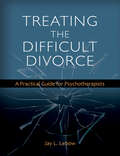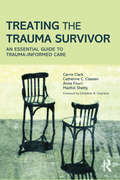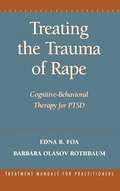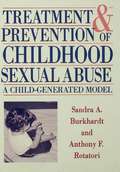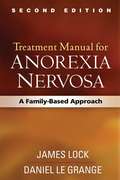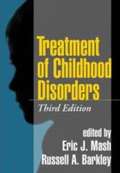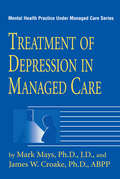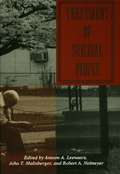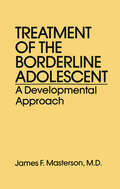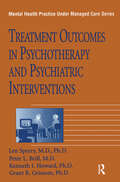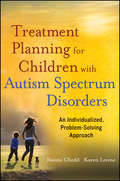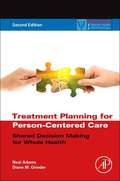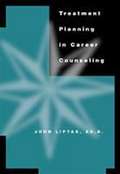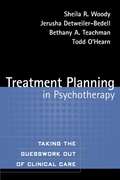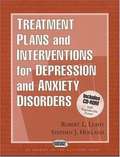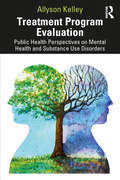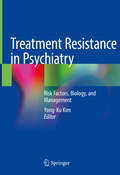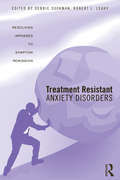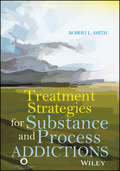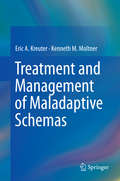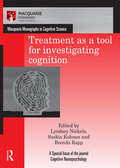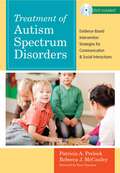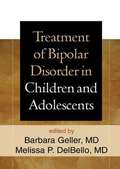- Table View
- List View
Treating the Difficult Divorce: A Practical Guide for Psychotherapists
by Jay L. Lebow PhDThis book presents a comprehensive, integrative, systemic approach to psychotherapy with families undergoing difficult divorce. Divorce can be an exceptional challenge for couples and children who must endure acrimony, accusations, fear and anxiety for the future. Divorce is also a substantial challenge for mental health professionals, as standard psychotherapeutic approaches can prove insufficient for the complexities of families in crisis. Drawing on the integrative tradition that considers both individual and systemic processes, as well as his nearly forty years of clinical practice, Dr. Lebow describes strategies for intervention that show therapists how to calm individuals, couples, and families in acute distress, and help ease the transition to a new family structure. Chapters highlight the research on divorce and mental health, describe concrete interventions that achieve realistic treatment goals, explain how therapists interact with the legal system in divorce cases, and offer adaptations for different types of divorce, including high-conflict and more normative divorces. This book can be used by one or more therapists, working with couples, a parent and child, a former partner, or even a single parent or child.
Treating the Trauma Survivor: An Essential Guide to Trauma-Informed Care
by Carrie Clark Catherine C. Classen Anne Fourt Maithili ShettyTreating the Trauma Survivor is a practical guide to assist mental health, health care, and social service providers in providing trauma-informed care. This resource provides essential information in order to understand the impacts of trauma by summarizing key literature in an easily accessible and user-friendly format. Providers will be able to identify common pitfalls and avoid re- traumatizing survivors during interactions. Based on the authors’ extensive experience and interactions with trauma survivors, the book provides a trauma-informed framework and offers practical tools to enhance collaboration with survivors and promote a safer helping environment. Mental health providers in health care, community, and addictions settings as well as health care providers and community workers will find the framework and the practical suggestions in this book informative and useful.
Treating the Trauma of Rape: Cognitive-behavioral Therapy for PTSD
by Edna B. Foa Barbara Olasov RothbaumIn the U. S. alone, approximately 1. 5 million adult female survivors of rape are estimated to suffer from chronic PTSD. This invaluable book--informed by the latest research and written by two of the leading authorities in the field--provides a step-by-step guide to proven brief therapy techniques for treating traumatized women. Filling an urgent need of front-line practitioners working within managed care guidelines, the book includes numerous case examples illustrating sensitive and effective information-gathering and intervention, as well as explanations of how to cope with common problems and complications in treatment.
Treatment And Prevention Of Childhood Sexual Abuse
by Anthony F. Rotatori Sandra A. BurkhardtFirst published in 1995. Routledge is an imprint of Taylor & Francis, an informa company.
Treatment Manual for Anorexia Nervosa, Second Edition
by Daniel Le Grange James LockThis indispensable manual presents the leading empirically supported treatment approach for adolescents with anorexia nervosa (AN). What sets family-based treatment apart is the central role played by parents and siblings throughout therapy. The book gives practitioners a clear framework for mobilizing parents to promote their child's weight restoration and healthy eating; improving parent & child relationships; and getting adolescent development back on track. Each phase of therapy is described in session-by-session detail. In-depth case illustrations show how to engage clients while flexibly implementing the validated treatment procedures. New to This Edition Reflects the latest knowledge on AN and its treatment, including additional research supporting the approach. More user friendly clarifies key concepts and techniques. Chapter on emerging directions in training and treatment dissemination. Many new clinical strategies.
Treatment Of Childhood Disorders
by Russell A. Barkley Eric J. MashThis major professional reference and text offers an authoritative review of evidence-based treatments for the most prevalent child and adolescent problems. Leading contributors present applications for anxiety disorders, depressive disorders, ADHD, autistic spectrum disorders, learning disabilities, the effects of maltreatment, substance use, and more.
Treatment Of Depression In Managed Care (Mental Health Practice Under Managed Care Ser. #No.7)
by Mark Mays James W. CroakePublished in 1997, Treatment of Depression in Managed Care is a valuable contribution to the field of Psychiatry/Clinical Psychology.
Treatment Of Suicidal People (Series in Death, Dying, and Bereavement)
by Robert A. Neimeyer Antoon A. Leenaars John T. MaltsbergerTreatment of suicidal people takes three forms: prevention - strategies to avert conditions leading to suicide; intervention - treatment and care during the crisis; and postvention - response after the event has occurred. Unlike other current literature, here the focus is on the state of the art of intervention. This type of examination is essential, because suicidal people themselves are in need of such treatments - crisis intervention, psychotherapy, psychopharmacology and hospitalization. Written by professionals in the field, the Treatment of Suicidal People allows readers to participate in a learning experience. First is a case presentation of an individual - Arthur Inman - and his long road toward suicide, as chronicled in his personal diary. The seond section puts forth guidelines for the evaluation of suicide risk and crisis intervention. A focus on more sustained efforts in psychotherapy is next, a theme which is continued in the fourth part by addressing psychiatric issues that are essential for treatment of highly disturbed and lethal patients. The following section examines a number of clinical and legal issues that transcend any one population of suicidal people, and any particular treatment approach or context. And lastly, the volume returns to Arthur Inman, with case consultations providing alternative perspectives and recommendations on his treatment. Suicide and related forms of self-injurious behaviour can be circumvented, if the involved professionals are sufficiently trained in assessment and prevention.
Treatment Of The Borderline Adolescent: A Developmental Approach
by James F. Masterson, M.D.First published in 1986. Routledge is an imprint of Taylor & Francis, an informa company.
Treatment Outcomes In Psychotherapy And Psychiatric Interventions (Brunner/mazel Mental Health Practice Under Managed Care Ser. #Vol. 6)
by Len Sperry Peter L. Brill Kenneth I. Howard Grant R. GrissomPublished in 1996, Treatment Outcomes in Psychotherapy and Psychiatric Interventions is a valuable contribution to the field of Psychiatry/Clinical Psychology
Treatment Planning For Children With Autism Spectrum Disorders
by Karen Levine Naomi CheddA new way of thinking about treatment planning to support children with autism spectrum disorders Grounded in solid theory, Treatment Planning for Children with Autism Spectrum Disorders: An Individualized, Problem-Solving Approachhelps educators and therapists who work with children with autism spectrum disorders make sense of this confusing, often conflicting, and rapidly evolving clinical and research treatment landscape. Rooted in evidence-based practices, Chedd and Levine provide a 7-step dynamic treatment planning process. The book shows how a variety of current interventions and treatments can be incorporated into this process and includes applications of different approaches for tackling different problems. The nine illustrative case vignettes cover a wide variety of ages, developmental challenges, learning and social profiles, and school and family circumstances. With a firm commitment to and focus on the child's best interests as well as family needs and preferences, Treatment Planning for Children with Autism Spectrum Disorders offers professionals new possibilities for enhancing the quality of life for children with ASDs.
Treatment Planning for Person-Centered Care: Shared Decision Making for Whole Health
by Neal Adams Diane M. GriederThis book guides therapists in how to engage clients in building and enacting collaborative treatment plans that result in better outcomes.
Treatment Planning for Psychotherapists
by Richard B. MakoverThis popular book offers a straightforward, practical method of organizing a treatment plan. It emphasizes a top-down, results-oriented approach that begins with the proposed outcome and then selects the objectives and methods to reach it. <p><p>In this revised edition, Dr. Makover describes a new, simplified system that uses the initial assessment to formulate a case. The formulation then becomes the foundation of treatment decisions. Clinical cases offer clear examples of the planning process. Individual chapters deal with the therapeutic alliance and the treatment contract, how to measure progress, when to end treatment, the treatment impasse, overcoming common challenges, dealing with difficult patients, and how to handle third party requirements. <p><p>Additional learning ideas include suggestions for further skill development and a list of recommended readings. Written in an easy-to-read format, this book will help both the beginner and the experienced therapist become more effective, flexible and successful in the art of psychotherapy.
Treatment Planning in Career Counseling
by John J. LiptakThis process-oriented, how-to, and clinically oriented text is the book that the market has been waiting for. Ideal for both beginning and experienced career counselors, the text reviews the most influential career development theories and illustrates how to use them in developing treatment plans. The author provides a practical focus on how to most effectively and competently use these theories in practice, leaving the comprehensive overview and in-depth discussion of theories for other career counseling texts.
Treatment Planning in Psychotherapy
by Sheila R. Woody Jerusha Detweiler-BedellThis user-friendly book helps clinicians of any theoretical orientation meet the challenges of evidence-based practice. Presented are tools and strategies for setting clear goals in therapy and tracking progress over the course of treatment, independent of the specific interventions used. A wealth of case examples illustrate how systematic treatment planning can enhance the accountability and efficiency of clinical work and make reporting tasks easier without taking up too much time. Special features include flowcharts to guide decision making, sample assessment tools, sources for a variety of additional measures, and instructions for graphing client progress. Ideal for busy professionals, the book is also an invaluable text for graduate-level courses and clinical practica.
Treatment Plans and Interventions for Depression and Anxiety Disorders
by Robert L. Leahy Stephen J. HollandThis book is a unique and practical clinician's toolbox and includes bibliographical references and index. This book pulls together all the pieces a clinician needs to do effective therapy for seven of the most common disorders and integrates symptoms, theory, interventions, patient education, and data collection so well for so many diagnoses.
Treatment Program Evaluation: Public Health Perspectives on Mental Health and Substance Use Disorders
by Allyson KelleyThis invaluable text provides a rigorous guide to the assessment and evaluation of treatment programs through a multi-disciplinary, holistic model of care. It highlights issues of race, social justice, and health equity, and offers real-world guidance to effect community healing and transformation. Written by a researcher and experienced evaluator, the book begins by outlining the theories and research which frame our understanding of substance misuse, and upon which treatment programs are based. It then examines the principles which should underpin any evaluation, before detailing the practical various steps required to conduct an evaluation, from data collection to outcome measurement. The book shows, too, through detailed and effective evaluation, policy changes can be made and treatment programs improved. Including practical examples of evaluation and assessment throughout, and also assessing the numerous social systems which can support recovery, the book builds to a four-step public health model for establishing sustainable treatment programs. In an era where substance misuse has reached epidemic proportions in the United States and beyond, this book will be essential reading for anyone involved in public health policy and practice in this important area.
Treatment Resistance in Psychiatry: Risk Factors, Biology, And Management
by Yong-Ku KimThis book reviews all the important aspects of treatment-resistant psychiatric disorders, covering issues such as definitions, clinical aspects, neurobiological correlates, treatment options, and predictors of treatment response. The book is divided into three sections, the first of which examines the most recent thinking on treatment resistance in psychiatry, including definition and epidemiology, paradigm shift in the study of the subjects, individual susceptibility and resilience, abnormal structural or functional connectivity, and insights from animal models. The second section then discusses treatment resistance in each of the major psychiatric disorders, with particular focus on the responsible clinical and biological factors and the available management strategies. Finally, more detailed information is presented on diverse pharmacological and non-pharmacological therapeutic interventions. The book, written by leading experts from across the world, will be of value to all who seek a better understanding of the clinical-neurobiological underpinnings and the development of management for treatment resistance in psychiatric disorders.
Treatment Resistant Anxiety Disorders: Resolving Impasses to Symptom Remission
by Debbie SookmanTreatment Resistant Anxiety Disorders: Resolving Impasses to Symptom Remission brings together leading cognitive behavioral therapists from major theoretical orientations to provide clinicians with a greatly needed source of information, skills, and strategies from a wide range of CBT approaches. It describes how to combine empirically-based findings, broad based and disorder specific theoretical models, and individualized case conceptualization to formulate and apply specific strategies for varied aspects of resistance during treatment of anxiety disorders.
Treatment Strategies for Substance Abuse and Process Addictions
by Robert L. SmithThis distinctive and timely text examines the most prevalent substance and process addictions and focuses on current research and evidence-based treatment strategies. Major substance addictions discussed include alcohol, tobacco, marijuana, methamphetamines, and prescription drugs. Complete chapters are also devoted to the most frequently cited process addictions, making this text unique. Behavioral addictions covered in this text include pathological gambling, sex disorders, disordered eating, work, exercise, shopping, and Internet/gaming. Each chapter contains a listing of student learning outcomes, a case study with reflective questions, techniques for assessment and diagnosis, inpatient and outpatient treatment approaches, and resources for further study. With its emphasis on treatment strategies, this text can be used by practitioners as well as by professors in the classroom in introductory courses in addictions or in subsequent courses that focus on treatment strategies. *Requests for digital versions from the ACA can be found on wiley.com. *To request print copies, please visit the ACA website here. *Reproduction requests for material from books published by ACA should be directed to permissions@counseling.org.
Treatment and Management of Maladaptive Schemas
by Eric A. Kreuter Kenneth M. MoltnerThis volume explores new ground in the area of personal transformation, achieved partly through a person's volition with a guide or catalyst. The authors research and define the dynamics of paradigmatic-thinking, incorporating a series of case vignettes of personal transitions. They describe impediments to such change, as well as the post-transformation state of mind where vulnerabilities may persist. The resultant need for on going commitment may include guidance or coaching in order to sustain the positive effect of a change in paradigm. An important feature of the book is a case study written by "Rex," a participant in Dr. Kreuter's earlier work. Rex has achieved significant change in his thought process, both in how he sees the world (less sinister) and his self-perspective (worthy and connected). An in-depth view of the "new" Rex shows the extent to which change has been possible in one human being. Combined with other evidence of shifting paradigms drawn from a cross-section of therapeutic practice, the authors connect the clinical data with their own developed philosophy on the subject of human behavior and the ability to change with the assistance of a therapist guide to effectuate and sustain such change.
Treatment as a tool for investigating cognition (Macquarie Monographs in Cognitive Science)
by Lyndsey Nickels, Saskia Kohnen and Brenda RappCognitive neuropsychological research studies of people with cognitive deficits have typically been directed either at investigating methods of intervention, or at furthering our understanding of normal and impaired cognition. This book reports on research that combines these goals, using studies that use intervention as a ‘tool’ for investigating hypotheses about the functioning of the human cognitive system. The introductory chapter discusses some of the unique and more general difficulties that this approach faces, while the five reports describe intervention studies with children and adults with cognitive impairments – studies which investigate current theories of cognition. The studies demonstrate that the use of intervention to study cognition is a promising and valuable methodology. Aiming to promote wider use of these combined methods, this book makes it clear that while the approach faces various methodological and interpretative challenges, it has the advantage of providing advances on issues of theory while, at the same time providing treatment to participants, and bringing together what have been largely separate research traditions. This book was originally published as a special issue of Cognitive Neuropsychology.
Treatment for Posttraumatic Stress Disorder in Military and Veteran Populations
by Committee on the Assessment of Ongoing Effects in the Treatment of Posttraumatic Stress DisorderPrior to the military conflicts in Iraq and Afghanistan, wars and conflicts have been characterized by such injuries as infectious diseases and catastrophic gunshot wounds. However, the signature injuries sustained by United States military personnel in these most recent conflicts are blast wounds and the psychiatric consequences to combat, particularly posttraumatic stress disorder (PTSD), which affects an estimated 13 to 20 percent of U. S. service members who have fought in Iraq or Afghanistan since 2001. PTSD is triggered by a specific traumatic event - including combat - which leads to symptoms such as persistent re-experiencing of the event; emotional numbing or avoidance of thoughts, feelings, conversations, or places associated with the trauma; and hyperarousal, such as exaggerated startle responses or difficulty concentrating. As the U. S. reduces its military involvement in the Middle East, the Departments of Defense (DoD) and Veterans Affairs (VA) anticipate that increasing numbers of returning veterans will need PTSD services. As a result, Congress asked the DoD, in consultation with the VA, to sponsor an IOM study to assess both departments' PTSD treatment programs and services. Treatment for Posttraumatic Stress Disorder in Military and Veteran Populations: Initial Assessment is the first of two mandated reports examines some of the available programs to prevent, diagnose, treat, and rehabilitate those who have PTSD and encourages further research that can help to improve PTSD care.
Treatment of Autism Spectrum Disorders: Evidence-Based Intervention Strategies for Communication and Social Interactions
by Patricia A. Prelock Rebecca J. MccauleyThe authors aim to make the research and clinical literature on ASD (Autism Spectrum Disorders), accessible to a wide range of audiences -- parents and families of children with ASDs, frontline professionals and students, and professors who study ASDs.
Treatment of Bipolar Disorder in Children and Adolescents
by Melissa Delbello Barbara GellerRecent advances in evidence-based treatment of pediatric bipolar disorder are comprehensively reviewed in this authoritative volume. The prominent editors and contributors examine the current status of widely used medications and psychosocial therapies, and explore new horizons in tailoring treatment to individuals' neurobiological and clinical profiles. Chapters on specific populations discuss strategies for addressing common co-occurring disorders in children and adolescents with bipolar disorder, treating preschoolers, targeting depressive symptoms, and improving early intervention and prevention. Other essential topics include medication side effects and approaches to monitoring and ameliorating them, and ethical issues related to treatment and research.
